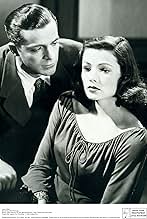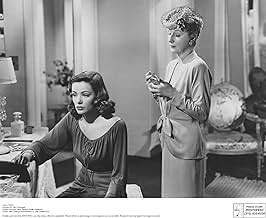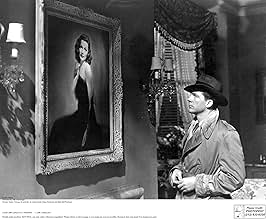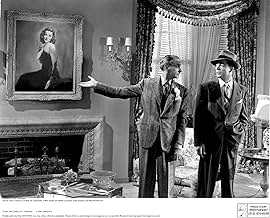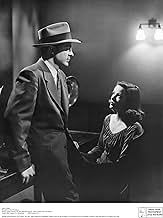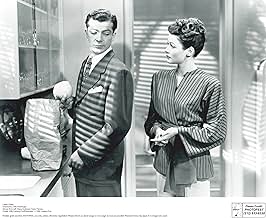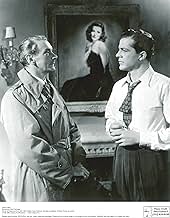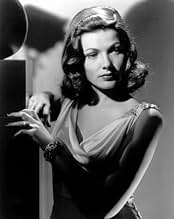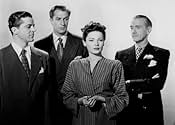Laura
- 1944
- Tous publics
- 1h 28min
NOTE IMDb
7,9/10
54 k
MA NOTE
Un inspecteur de police tombe amoureux de la femme dont il enquête le meurtre.Un inspecteur de police tombe amoureux de la femme dont il enquête le meurtre.Un inspecteur de police tombe amoureux de la femme dont il enquête le meurtre.
- Réalisation
- Scénario
- Casting principal
- Récompensé par 1 Oscar
- 7 victoires et 5 nominations au total
Grant Mitchell
- Lancaster Corey
- (scènes coupées)
Dorothy Adams
- Bessie Clary - Laura's Maid
- (non crédité)
Terry Adams
- Woman
- (non crédité)
John Alban
- Executive
- (non crédité)
Wally Albright
- Newsboy
- (non crédité)
Bobby Barber
- Newsboy
- (non crédité)
Edward Biby
- Party Guest
- (non crédité)
Gary Breckner
- Narrator
- (non crédité)
James Carlisle
- Party Guest
- (non crédité)
Harry Carter
- Party Guest
- (non crédité)
Lane Chandler
- Detective
- (non crédité)
Bill Chaney
- Newsboy
- (non crédité)
Dorothy Christy
- Woman
- (non crédité)
Avis à la une
A superbly stylish movie. None of its characters is without flaws - even the elusive Laura is too naive for her own good. They are presented lovingly by Preminger, and his award-winning DOP Joseph LaShelle.
The excellent script ranges from caustic Laedecker/Webb put-downs, through brutal Treadwell/Anderson self-assessment, to laconic MacPherson/Andrews minimalism.
The score is, of course, a classic. Raksin's sinuous melody, brilliantly deployed, haunts the picture as powerfully as Laura's portrait haunts Detective MacPherson.
The central performances are wonderful, not least because of the perfect casting. Tierney shines as the enigmatic title character: beautiful, intelligent, somehow both cool and passionate at the same time. Webb dazzles, Price slithers, Anderson simmers. Best of all is Andrews as the detective who barely opens his mouth when he speaks, and on whose face desire barely flickers - but he does enough to show you exactly what he wants and how he feels. It's a great movie performance from an underrated actor. Only Dorothy Adams doesn't quite fit, in a role - Laura's maid - that could easily have been as showy as the others with the right performer.
LAURA doesn't appear to be about anything significant, but it leaves behind it a feeling that it is greater than the sum of its parts. I don't know how this was managed, and perhaps no-one involved in it did either. It's one of those movies where everything just clicked. Seeing it again recently, after many years, confirms its status for me as a significant work, but exactly why or how remains as much of a puzzle as Laura herself.
The excellent script ranges from caustic Laedecker/Webb put-downs, through brutal Treadwell/Anderson self-assessment, to laconic MacPherson/Andrews minimalism.
The score is, of course, a classic. Raksin's sinuous melody, brilliantly deployed, haunts the picture as powerfully as Laura's portrait haunts Detective MacPherson.
The central performances are wonderful, not least because of the perfect casting. Tierney shines as the enigmatic title character: beautiful, intelligent, somehow both cool and passionate at the same time. Webb dazzles, Price slithers, Anderson simmers. Best of all is Andrews as the detective who barely opens his mouth when he speaks, and on whose face desire barely flickers - but he does enough to show you exactly what he wants and how he feels. It's a great movie performance from an underrated actor. Only Dorothy Adams doesn't quite fit, in a role - Laura's maid - that could easily have been as showy as the others with the right performer.
LAURA doesn't appear to be about anything significant, but it leaves behind it a feeling that it is greater than the sum of its parts. I don't know how this was managed, and perhaps no-one involved in it did either. It's one of those movies where everything just clicked. Seeing it again recently, after many years, confirms its status for me as a significant work, but exactly why or how remains as much of a puzzle as Laura herself.
Laura is a wonderful example of film noir. The cast is perfect. Dana Andrews is the detective assigned to investigate the murder of Laura (played by Gene Tierney). As he interviews her associates and becomes mesmerized by her portrait, he begins to fall for Laura posthumously. Clifton Webb plays her mentor perfectly and Vincent Price is classic as Laura's pretty boy fiance. Although the movie begins with Laura's murder, it still has incredible surprises and an awesome denouement. Andrews hard boiled detective and the dark, raining sets illustrate the meaning of film noir. I highly recommend it.
Laura is another brilliant addition to Hollywood's golden age with its incredible screenplay and a great non linear narrative structure. While it might not reach the heights of Double Indemnity or The Third Man, it is still a fantastic motion picture.
One thing that never seems to disappoint about ( Most of ) the classic Hollywood Film-Noirs is that they have incredible writing, and Laura is no different. The dialogue that is said is most of the time highly intellectual but shockingly coherent at the same time. This is especially the case whenever Waldo Lydecker ( Clifton Webb ) comes on screen, and his character, which is the vicious columnist, fits this poetic dialogue perfectly. ( Just look at the 'lunch' scene, or his narration near the end, or the narration where he describes Laura, as all of them have a superb screenplay ) Webb's impeccable delivery of these lines also helps ofcourse, as his performance is definitely the acting highlight of the show. Dana Andrews has the perfect face for this film noir detective kind of type, and his rugged and tough mannerisms fit perfectly for his character, although at times he might appear a bit wooden. Normally i do not care much for the outer look of women in film, but since Laura ( Gene Tierney ) is supposed to be this fascinating dame that everybody becomes obsessed with, it ofcourse helps that she is a looker, as this further enhances the immersion of the audience into the picture because it becomes relatable.
The indoor set design is as per usual in the golden age in Hollywood once again stunning. The cinematography uses a lot of low key lighting to capture the sinister and mysterious feel of the film perfectly, and the decoration of the sets is very elegantly created, with a lot of classic baubles in the background so the audience has enough to see in every shot in the entire film. The narrative is top notch, as it uses unpredictable twists and flashbacks created to enhance our relationship to the characters a bit more so we know what they were like before the 'murder'. Not a lot of characters are likeable, but those that are not likeable are so in a way that they still feel as if they were real people to which this is happening to. It is also a wonderful study on compulsive obsession ( The ending will show you why ) and man's nature to make rash decisions for the sake of love.
It does seem to be a bit too hasty near its final couple of minutes, but this is a slight issue that a lot of Hollywood films from this era seem to have. The haste is only there for the ending though, as the rest of the film is still executed wonderfully. The movie has the suspense in its narrative to keep the audience extremely interested in how its final events will unfold, and this creates a non stop thrill ride along the way.
Never does Laura insult our intelligence with obvious things, and instead it respects the audience's intelligence since every character seems to be highly intelligent in it, and the unpredictability of it further enhances this. It also has fantastic acting performances ( Especially Clifton Webb ) and a superb screenplay. Although the ending might seem to sudden, this still makes for a beautifully crafted Film Noir.
One thing that never seems to disappoint about ( Most of ) the classic Hollywood Film-Noirs is that they have incredible writing, and Laura is no different. The dialogue that is said is most of the time highly intellectual but shockingly coherent at the same time. This is especially the case whenever Waldo Lydecker ( Clifton Webb ) comes on screen, and his character, which is the vicious columnist, fits this poetic dialogue perfectly. ( Just look at the 'lunch' scene, or his narration near the end, or the narration where he describes Laura, as all of them have a superb screenplay ) Webb's impeccable delivery of these lines also helps ofcourse, as his performance is definitely the acting highlight of the show. Dana Andrews has the perfect face for this film noir detective kind of type, and his rugged and tough mannerisms fit perfectly for his character, although at times he might appear a bit wooden. Normally i do not care much for the outer look of women in film, but since Laura ( Gene Tierney ) is supposed to be this fascinating dame that everybody becomes obsessed with, it ofcourse helps that she is a looker, as this further enhances the immersion of the audience into the picture because it becomes relatable.
The indoor set design is as per usual in the golden age in Hollywood once again stunning. The cinematography uses a lot of low key lighting to capture the sinister and mysterious feel of the film perfectly, and the decoration of the sets is very elegantly created, with a lot of classic baubles in the background so the audience has enough to see in every shot in the entire film. The narrative is top notch, as it uses unpredictable twists and flashbacks created to enhance our relationship to the characters a bit more so we know what they were like before the 'murder'. Not a lot of characters are likeable, but those that are not likeable are so in a way that they still feel as if they were real people to which this is happening to. It is also a wonderful study on compulsive obsession ( The ending will show you why ) and man's nature to make rash decisions for the sake of love.
It does seem to be a bit too hasty near its final couple of minutes, but this is a slight issue that a lot of Hollywood films from this era seem to have. The haste is only there for the ending though, as the rest of the film is still executed wonderfully. The movie has the suspense in its narrative to keep the audience extremely interested in how its final events will unfold, and this creates a non stop thrill ride along the way.
Never does Laura insult our intelligence with obvious things, and instead it respects the audience's intelligence since every character seems to be highly intelligent in it, and the unpredictability of it further enhances this. It also has fantastic acting performances ( Especially Clifton Webb ) and a superb screenplay. Although the ending might seem to sudden, this still makes for a beautifully crafted Film Noir.
I'm not sure if "Laura" truly qualifies as a film noir, although it certainly looks the part. If anything, it is a bridge between the standard romantic dramas of the '30s and '40s and the far darker truly noir films, such as "Double Indemnity," in which the main characters are either weak, desperate, or truly evil.
Tierney, here, is luminous as always, but hardly unsympathetic. And Andrews is your basic Dick Tracy -- colorless, but solid and honest. It's no surprise then that Webb walks off with the film, but his character is significant in other ways. Outwardly fey, Waldo is a variation on the stock "gay" Hollywood character seen at a time when homosexuality was hinted at but never really acknowledged. He insists he loves Laura, but there appears to be no actual love affair. He chooses her clothes and hairstyles, shows her off on his arm, but never seems to have any real physical contact with her. (The visual clue is his apartment, filled with pretty things that no one is allowed to touch, although Waldo will gladly tell you how expensive they are.) His scenes with Andrews become far more complex in this context, particularly when he discusses the case with the detective from his bath. Their verbal sparring continues throughout the film, and Webb makes frequent remarks about why women find Andrews' type so alluring, while they reject more "refined" males of taste and breeding. But Webb's Waldo, despite the refinement, is a catty and cruel little monster, a man who writes of love, but has none in his life. Unlike David Wayne's comic sissy in "Adam's Rib," who repeatedly proclaims his love and adoration for Katharine Hepburn's Amanda, Webb's Waldo has an edge so vile that we fear him, and, because of that, can accept him as a suspect.
The film is also notable for Vincent Price's performance as a needy boy-toy who is manlier than Webb, but still sexually vague, indecisive and weak. Viewers unaccustomed to seeing Price in such roles may think he was miscast. Perhaps he was, but he seems to be doing precisely what he was supposed to do, giving Laura another worldly but inappropriate suitor.
The plot, predictable or not, is great fun; a bit of a whodunit with a psychological edge. The score is legendary, and like the painting Andrews falls in love with, the music gives the film its haunting quality, particularly at those moments when we segue into another flashback.
There's a bit of inscrutability in most of Tierney's performances, which makes her perfect for this role. We rarely know what she's thinking, or precisely how she feels about the other characters. And because of this, her flashbacks provide few clues as to why anyone would want to murder her.
There are a few other suspects, of course, including the great Judith Anderson, and there's even a smart little cocktail party where you can look them over one more time. As for who really did kill Laura -- well, good luck with that one.
Tierney, here, is luminous as always, but hardly unsympathetic. And Andrews is your basic Dick Tracy -- colorless, but solid and honest. It's no surprise then that Webb walks off with the film, but his character is significant in other ways. Outwardly fey, Waldo is a variation on the stock "gay" Hollywood character seen at a time when homosexuality was hinted at but never really acknowledged. He insists he loves Laura, but there appears to be no actual love affair. He chooses her clothes and hairstyles, shows her off on his arm, but never seems to have any real physical contact with her. (The visual clue is his apartment, filled with pretty things that no one is allowed to touch, although Waldo will gladly tell you how expensive they are.) His scenes with Andrews become far more complex in this context, particularly when he discusses the case with the detective from his bath. Their verbal sparring continues throughout the film, and Webb makes frequent remarks about why women find Andrews' type so alluring, while they reject more "refined" males of taste and breeding. But Webb's Waldo, despite the refinement, is a catty and cruel little monster, a man who writes of love, but has none in his life. Unlike David Wayne's comic sissy in "Adam's Rib," who repeatedly proclaims his love and adoration for Katharine Hepburn's Amanda, Webb's Waldo has an edge so vile that we fear him, and, because of that, can accept him as a suspect.
The film is also notable for Vincent Price's performance as a needy boy-toy who is manlier than Webb, but still sexually vague, indecisive and weak. Viewers unaccustomed to seeing Price in such roles may think he was miscast. Perhaps he was, but he seems to be doing precisely what he was supposed to do, giving Laura another worldly but inappropriate suitor.
The plot, predictable or not, is great fun; a bit of a whodunit with a psychological edge. The score is legendary, and like the painting Andrews falls in love with, the music gives the film its haunting quality, particularly at those moments when we segue into another flashback.
There's a bit of inscrutability in most of Tierney's performances, which makes her perfect for this role. We rarely know what she's thinking, or precisely how she feels about the other characters. And because of this, her flashbacks provide few clues as to why anyone would want to murder her.
There are a few other suspects, of course, including the great Judith Anderson, and there's even a smart little cocktail party where you can look them over one more time. As for who really did kill Laura -- well, good luck with that one.
The first time I saw this film, about eight years ago I ended up almost losing a friend because I was hoarding the VHS copy he had lent me for about two months. After seeing it, I quite simply didn't want to give up the tape because in doing so, I wouldn't be able to watch it anytime I wanted to; and I did watch it anytime I wanted to, and often, until he threatened to call a Noir Intervention. I may have loved this film from the first viewing, but I wasn't prepared to deal with something like that, as entertaining as it may have been.
I fell in love with `Laura' because it is biting and evil, intelligent and surprising. The unfathomably gorgeous Gene Tierney plays the title character, an advertising executive whose best friend Waldo Lydecker (played by the always wonderful Clifton Webb) and fiancée Shelby, (a really young Vincent Price) are some of the prime suspects in her murder. The gruff detective leading the case (Dana Andrews) is Det. McPherson, and he quickly essentially falls in love with a ghost while he is trying to solve her murder.
`Laura' has one of the great Noir scripts in that just as the audience thinks they have the case solved, another curve ball is thrown at them which blows that theory out of the water. The acting is pure delightful melodrama, but Clifton Webb's performance is simply show-stopping. His character is a vicious snit of a writer who uses his column as a weapon against anyone he doesn't like or even tolerate. Even upon multiple viewings I can't help but howl at some of his lines and mannerisms.
If anyone was to request suggestions for good Film Noir movies, I would prescribe a heavy dose of `Laura' because it has something for everyone in that it is romantic, thrilling, mysterious, wickedly funny and above all, thoroughly entertaining.
--Shelly
I fell in love with `Laura' because it is biting and evil, intelligent and surprising. The unfathomably gorgeous Gene Tierney plays the title character, an advertising executive whose best friend Waldo Lydecker (played by the always wonderful Clifton Webb) and fiancée Shelby, (a really young Vincent Price) are some of the prime suspects in her murder. The gruff detective leading the case (Dana Andrews) is Det. McPherson, and he quickly essentially falls in love with a ghost while he is trying to solve her murder.
`Laura' has one of the great Noir scripts in that just as the audience thinks they have the case solved, another curve ball is thrown at them which blows that theory out of the water. The acting is pure delightful melodrama, but Clifton Webb's performance is simply show-stopping. His character is a vicious snit of a writer who uses his column as a weapon against anyone he doesn't like or even tolerate. Even upon multiple viewings I can't help but howl at some of his lines and mannerisms.
If anyone was to request suggestions for good Film Noir movies, I would prescribe a heavy dose of `Laura' because it has something for everyone in that it is romantic, thrilling, mysterious, wickedly funny and above all, thoroughly entertaining.
--Shelly
Le saviez-vous
- AnecdotesAccording to Producer and Director Otto Preminger, he had to work to win the respect of the cast, who all seemed "hostile" to him when he took over, with the exception of Clifton Webb. "I learned later", he said, "that Mamoulian had called each of them individually and warned them that I did not like their acting and intended to fire them." It was not true. Dame Judith Anderson decided to confront him on the set. She said that if he wasn't happy with her performance, then he should show her how to make it better.
- GaffesIn the initial long-shot when McPherson and Lydecker are out to dinner, McPherson's chair is unoccupied (about 15:28). When the camera is at their table, McPherson has materialized.
- Citations
Waldo Lydecker: I don't use a pen. I write with a goose quill dipped in venom.
- Versions alternativesA scene cut from the theatrical version after its initial release was restored to the film in 1990. In it, Waldo Lydecker described how he transformed Laura's appearance and introduced her to high society. The studio worried that this obsession with decadent luxury would be offensive to WWII soldiers serving overseas, so the scene was deleted.
- ConnexionsFeatured in Le crime était signé (1953)
Meilleurs choix
Connectez-vous pour évaluer et suivre la liste de favoris afin de recevoir des recommandations personnalisées
Détails
Box-office
- Budget
- 1 020 000 $US (estimé)
- Montant brut mondial
- 1 356 $US
- Durée1 heure 28 minutes
- Couleur
- Rapport de forme
- 1.37 : 1
Contribuer à cette page
Suggérer une modification ou ajouter du contenu manquant



